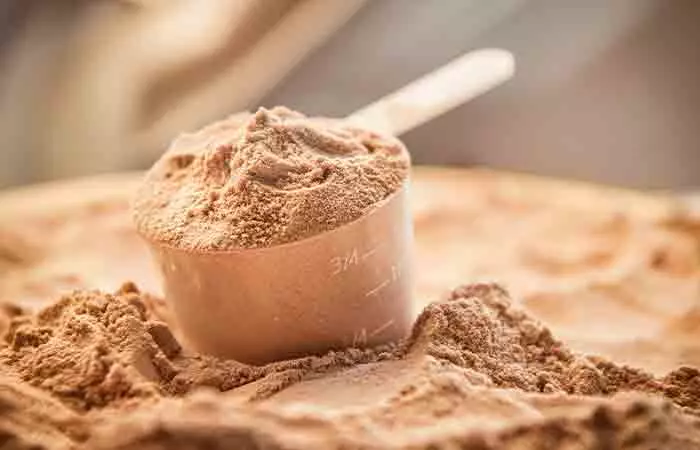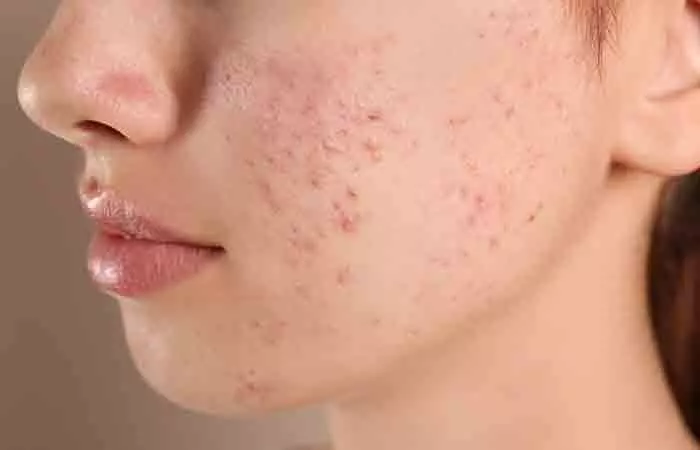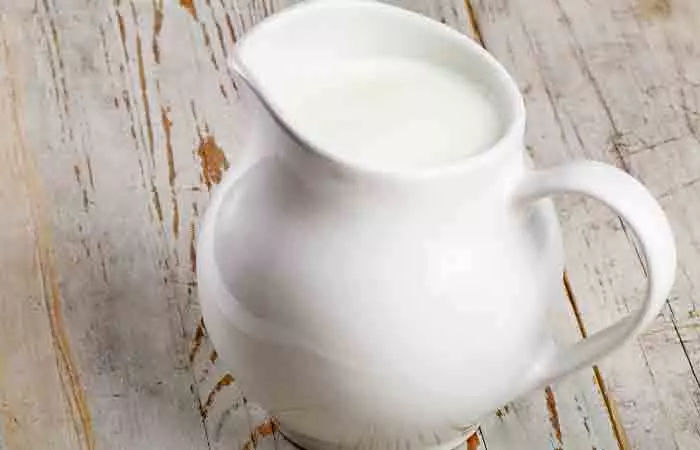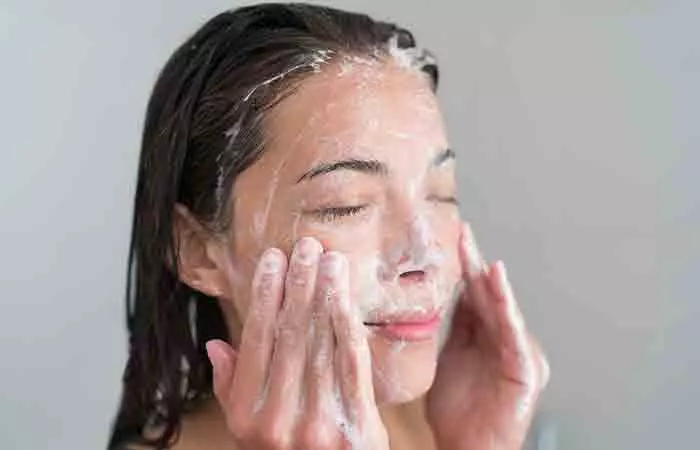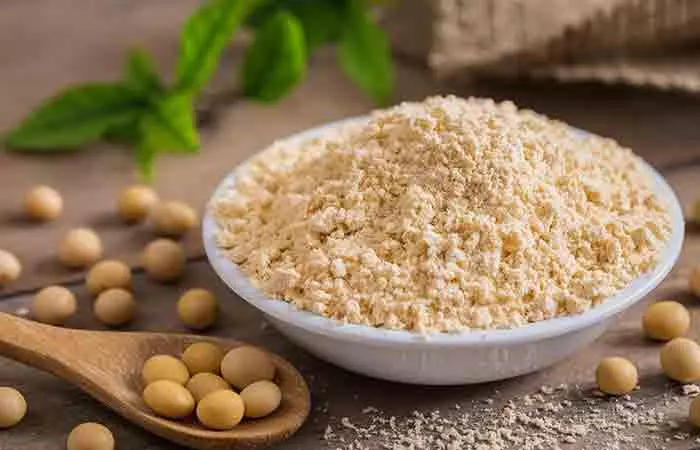Whey Protein: Does It Really Cause Acne?
Yes. Whey protein may cause acne as it is derived from milk (along with casein) and forms as a by-product of the cheese-making process. There are many foods that cause acne, like dairy. Dairy intake is linked to acne (2). Several studies have found a possible link between the two:
A study involving teenage athletes found that whey protein triggered acne lesions in them, and they diminished once the drink was discontinued (3). However, further studies are required to determine the exact mechanism. In another study, researchers observed that whey protein could enhance insulin levels or insulin-like growth factor 1 (IGF-1) and aggravate acne in healthy men (4). In a study involving 30 patients, researchers found that females were prone to develop acne after taking whey protein. They also concluded that whey protein could trigger acne in people with no active lesions and no family history of acne (5).
A survey was conducted of 11,000 participants with 2826 in the acne group and 3853 in the control group from ages 15 to 39. It was found that 11% of the people in the first group consumed whey proteins in the last 12 months, compared to 7.3% in the second group. Hannah Esch, a YouTuber and fitness coach, explained her decision to transition from whey protein to vegan protein due to concerns about potential links between whey protein isolate and acne. She shared that her dermatologist had recommended discontinuing whey protein consumption. She says, “The whole reason that I swapped from whey protein to vegan protein is because there are links between whey protein isolate and my dermatologist recommended that I don’t drink whey protein anymore (i).” While there may be many whey protein benefits, you cannot deny there is a link between this supplement and acne. While further studies are required to determine the exact mechanism and link between both, it is clear that whey protein aggravates and triggers acne. Let’s explore the possible reasons and mechanisms in the next section.
How Whey Protein May Trigger Acne: The Mechanism
One of the side effects of whey proteins is acne outburst. Dairy products (including whey protein) spike up blood sugar levels and produce insulin and insulin-like growth factor (IGF-1) in your body. IGF-1 is the factor that is thought to accelerate muscle growth and trigger acne. Milk has a low glycemic index (GI), but it also triggers the release of comedogenic hormones like progesterone, estrogen, androgen precursors, and 5-alpha-reductase steroids. This hormone imbalance increases excess sebum production, abnormal keratinization, and bacterial proliferation, causing acne (5), (6), (7). Mary Sabat, MS, RD, LD, says, “Consuming too much protein can increase the production of hormones, such as testosterone, which can lead to hormonal acne in some people. Also, animal protein, if not organic, may contain hormones that get into your system and cause skin issues.” Most of us consume whey protein either with our food, smoothies, or water. The ingredients you add to your protein powder also make a difference. Scroll down to know more!
Ingredients To Avoid In Your Protein Shakes
What you mix in your protein shake may also play a key role in acne. Adding milk, especially skim milk, may double the risk of acne. Manufacturers often add whey protein to skim milk to maintain its consistency. Moreover, compared to regular and full-fat milk, skim milk increases the risk of comedogenesis (formation of comedones due to clogged pores) (8), (9). Hence, avoid preparing your protein shakes with skimmed milk. It is best to avoid any foods that may trigger acne. However, it may not always be possible if you are into athletics. Here are a few ways to prevent and manage breakouts caused by whey proteins.
How To Prevent Acne Breakouts Caused By Whey Protein
Along with these tips, a few simple lifestyle changes can work wonders for your skin. Eating a balanced diet full of fruits and veggies, managing stress, and staying hydrated can all help prevent breakouts. Small steps like these will leave your skin glowing in no time! Keep up the excellent work, and your skin will thank you.
Whey Protein Alternatives
The best alternatives for whey protein include:
Pea protein powder – Derived from yellow peas and rich in essential amino acids. Soy protein powder – Made from soybeans and a complete protein, containing all nine essential amino acids. Egg white protein powder – Made by drying and pulverizing egg whites and low in fat and carbohydrates, making it ideal for low-carb diets. Brown rice protein powder – Derived from whole brown rice grains and easily digestible and hypoallergenic. Hemp protein powder – A plant-based protein source containing all essential amino acids along with fiber, magnesium, and omega-3 fatty acids. Collagen protein – Sourced from animal connective tissues, often bovine or marine sources. Pumpkin seed protein – Made from roasted, hulled pumpkin seeds, offering essential amino acids and minerals. Bone broth protein – Derived from simmered animal bones and provides essential amino acids, collagen, and minerals.
Other than these protein powders, nuts, lentils, and oily fish are good protein sources. Sabat adds, “It is best to follow a balanced diet and speak to a doctor or dietitian to determine the appropriate amount of protein for an individual’s needs. All animal protein, including whey, should be organic from grass-fed animals.” Acne may also be a side effect of protein supplements. Plant-based protein powders are easier to digest than whey protein and carry an abundance of nutrition too. However, before buying, check the product to ensure they contain minimally processed ingredients. How long does whey protein acne take to go away? Whey protein acne takes approximately 2 -3 months to clear out completely. However, the time period varies from person to person. Is whey protein good for the skin? Yes, whey protein is good for the skin. Its amino acids and collagen help maintain skin elasticity and firmness. Is it safe to take whey protein every day? Yes, whey protein is safe for daily consumption for most people. However, limiting the quantity to 1-2 scoops is generally advised.
Illustration: Does Whey Protein Cause Acne? How To Prevent It
Unveil the truth behind protein powder and acne with this eye-opening video. Click on it to explore the potential connection and make informed choices for your skin health and fitness journey.
